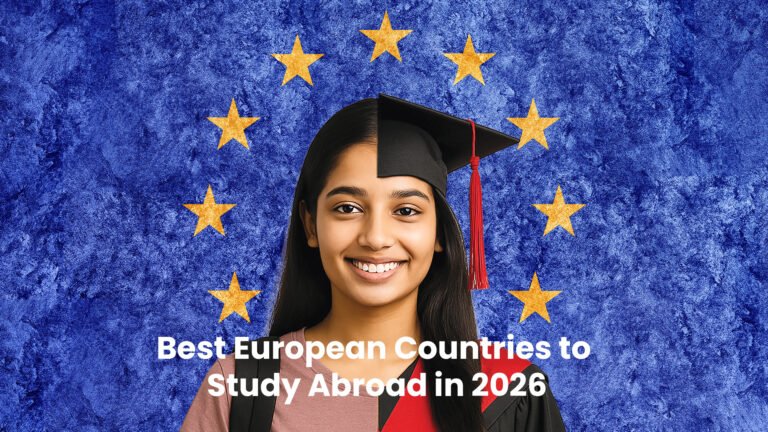Top Countries Offering PR After Study for Indian Students 2026
Top Countries Offering PR After Study for Indian Students 2026
For Indian students dreaming of building an international career, securing Permanent Residency (PR) after completing their studies abroad is a significant milestone. The year 2026 promises exciting opportunities for those looking to transition from student visas to permanent settlement in some of the world's most developed nations.
This comprehensive guide explores the top countries offering PR after study for Indian students, detailing the pathways, requirements, and strategies to maximize your chances of success. Understanding these immigration pathways is crucial for making informed decisions about your study abroad journey and long-term career planning.
Get Free CounsellingTable of Contents
- Understanding PR After Study Options
- Canada: Top Choice for PR After Study
- Australia: Streamlined PR Pathways
- Germany: Europe's PR Powerhouse
- New Zealand: Straightforward PR Process
- USA: Competitive But Rewarding PR Options
- UK: Updated Post-Study Work Visa
- Ireland: Emerging PR Destination
- Country Comparison: PR Requirements
- Preparation Tips for PR After Study 2026
- Frequently Asked Questions
- Conclusion: Your Path to Permanent Residency
Understanding PR After Study Options for International Students
Permanent Residency (PR) status allows international students to live, work, and study in a foreign country indefinitely, with most rights similar to citizens (except voting). For Indian students, securing PR after study provides stability, career growth opportunities, and a pathway to eventual citizenship.
Key Benefits of PR After Study:
- Freedom to work for any employer in any industry
- Access to social benefits and healthcare systems
- Pathway to citizenship after meeting residency requirements
- Ability to sponsor family members for residency
- Increased job security and career advancement opportunities
- Access to business ownership and investment opportunities
The process of obtaining PR after study typically involves transitioning from a student visa to a post-study work visa, gaining relevant work experience, and then applying for permanent residency through points-based systems, employer sponsorship, or specific immigration programs.
For 2026, several countries are expected to introduce updated immigration policies to attract and retain international talent. Understanding these evolving landscapes is crucial for Indian students planning their study abroad journey with long-term settlement goals.
Get Free CounsellingCanada: Top Choice for PR After Study for Indian Students
Canada remains the most popular destination for Indian students seeking PR after study, thanks to its transparent immigration system and welcoming policies. The country's Express Entry system and Provincial Nominee Programs (PNPs) provide multiple pathways to permanent residency.
Canada PR Pathways for International Students
Express Entry System
The Express Entry system manages applications for three economic immigration programs:
- Canadian Experience Class (CEC): Specifically for those with Canadian work experience
- Federal Skilled Worker Program (FSWP): For skilled professionals with foreign experience
- Federal Skilled Trades Program (FSTP): For qualified tradespeople
Provincial Nominee Programs (PNPs)
Many Canadian provinces have specific streams for international graduates:
- Ontario Immigrant Nominee Program (OINP)
- British Columbia Provincial Nominee Program (BC PNP)
- Manitoba Provincial Nominee Program (MPNP)
- Alberta Immigrant Nominee Program (AINP)
Post-Graduation Work Permit (PGWP)
The PGWP allows graduates to work in Canada for up to three years, providing crucial Canadian work experience needed for PR applications.
Express Entry CRS Points
International graduates can earn additional points for:
- Canadian education credentials
- Canadian work experience
- Strong official language proficiency
- Provincial nomination (600 bonus points)
Eligibility Requirements
Basic requirements for Canada PR after study:
- Completion of at least 8-month program at DLI
- Valid Post-Graduation Work Permit
- At least 1 year skilled work experience in Canada
- Language test results (IELTS/CELPIP)
- Educational Credential Assessment (ECA)
For 2026, Canada has announced plans to welcome over 500,000 new permanent residents annually, with significant allocations for economic immigration programs that benefit international students. The country's aging population and workforce shortages continue to drive demand for skilled young immigrants.
According to Immigration, Refugees and Citizenship Canada, international students with Canadian education and work experience have significantly higher success rates in obtaining PR compared to other applicants.
Get Free CounsellingAustralia: Streamlined PR Pathways for Indian Students
Australia offers attractive post-study work opportunities and multiple pathways to permanent residency for international graduates. The country's points-based immigration system rewards young, skilled professionals with Australian qualifications.
Australia PR Pathways for International Students
Temporary Graduate Visa (Subclass 485)
This visa allows international students to live, study and work in Australia temporarily after finishing their studies:
- Graduate Work Stream: For international students with skills and qualifications relevant to specific occupations
- Post-Study Work Stream: For international students who graduate with a higher education degree
Skilled Independent Visa (Subclass 189)
Points-tested visa for skilled workers who are not sponsored by an employer, family member or territory government.
Skilled Nominated Visa (Subclass 190)
For skilled workers who are nominated by a state or territory government.
Skilled Work Regional Visa (Subclass 491)
For skilled workers who want to live and work in regional Australia.
The Australian points system awards points for factors including age, English language ability, skilled employment experience, educational qualifications, and study in regional Australia. International graduates can significantly boost their points through Australian qualifications.
For Indian students, the Australia-India Economic Cooperation and Trade Agreement (AI-ECTA) has created additional opportunities, with provisions for streamlined visa processing and extended post-study work rights for Indian graduates in specific fields.
According to the Department of Home Affairs Australia, international graduates account for a significant portion of skilled migration visas granted each year, highlighting the importance of Australian education in the immigration pathway.
Get Free CounsellingGermany: Europe's PR Powerhouse for Indian Students
Germany has emerged as a top destination for Indian students seeking quality education and post-study residency options in Europe. The country's strong economy, high-quality education system, and favorable immigration policies make it an attractive choice.
Germany PR Pathways for International Students
Post-Study Residence Permit
After graduation, international students can extend their residence permit for up to 18 months to seek employment related to their field of study.
EU Blue Card
For graduates who secure a job with a minimum annual salary threshold (€45,300 in 2024, expected to increase by 2026).
Settlement Permit (Niederlassungserlaubnis)
After holding a residence permit for specific periods (usually 2-5 years), graduates can apply for a settlement permit (permanent residency).
Germany offers particularly favorable conditions for STEM graduates, with high demand for engineers, IT professionals, and researchers. The country's points-based system for skilled workers also benefits international graduates with German qualifications.
An important advantage for Indian students is that time spent studying in Germany counts toward the residency requirement for permanent settlement - typically 2 years for EU Blue Card holders and 5 years for other residence permits.
According to the German Federal Office for Migration and Refugees, the country has seen a significant increase in international students transitioning to the German workforce, with high retention rates among Indian graduates.
Get Free CounsellingNew Zealand: Straightforward PR Process for Indian Students
New Zealand offers a relatively straightforward pathway to permanent residency for international students through its Skilled Migrant Category. The country's high quality of life and work-life balance make it an appealing destination.
New Zealand PR Pathways for International Students
Post-Study Work Visa
Allows graduates to work for any employer in New Zealand for 1-3 years depending on qualification level.
Skilled Migrant Category (SMC) Resident Visa
Points-based system that assesses age, work experience, qualifications, and job offer in New Zealand.
Green List Straight to Residence Pathway
For roles on the Green List (high-demand occupations), graduates can apply for residence directly if they have a job offer.
Work to Residence Visa
For those with job offers in occupations that are on certain skills shortage lists.
New Zealand's points system awards points for factors including age (preference for applicants under 55), skilled employment in New Zealand, qualifications (with bonus points for New Zealand qualifications), work experience, and partner qualifications.
The country's recent immigration reforms have created more streamlined pathways for international graduates, particularly those with qualifications in areas of skill shortage. The Green List specifically identifies roles with high demand where immigration is encouraged.
According to Immigration New Zealand, international graduates with New Zealand qualifications have higher success rates in obtaining residency, particularly when they have local work experience in their field of study.
Get Free CounsellingUSA: Competitive But Rewarding PR Options for Indian Students
While the United States has a more complex and competitive pathway to permanent residency, it remains a top destination for Indian students due to its world-class education system and career opportunities, particularly in technology and research.
USA PR Pathways for International Students
Optional Practical Training (OPT)
Allows international students to work in their field of study for up to 12 months (36 months for STEM graduates) after completion of studies.
H-1B Visa
Temporary work visa that serves as a common pathway toward employment-based green cards.
Employment-Based Green Cards
Several categories including:
- EB-1: Priority workers
- EB-2: Professionals with advanced degrees
- EB-3: Skilled workers and professionals
National Interest Waiver (NIW)
For professionals whose work is in the national interest of the United States.
The primary challenge for Indian students in the US is the lengthy backlog for employment-based green cards, particularly in the EB-2 and EB-3 categories. However, students with exceptional abilities or those working in cutting-edge research and development may qualify for faster pathways.
For STEM graduates, the 36-month OPT period provides valuable time to gain work experience and potentially secure H-1B status through the annual lottery system. While competitive, success in the H-1B lottery can lead to employer-sponsored green card applications.
According to the U.S. Citizenship and Immigration Services, Indian nationals represent a significant portion of employment-based green card applicants, highlighting both the demand and the challenges in the current system.
Get Free CounsellingUK: Updated Post-Study Work Visa for Indian Students
The United Kingdom has reintroduced favorable post-study work options with the Graduate Route visa, making it an increasingly attractive destination for Indian students considering long-term settlement prospects.
UK PR Pathways for International Students
Graduate Route Visa
Allows international students to stay in the UK for 2 years (3 years for PhD graduates) after studies to work or look for work.
Skilled Worker Visa
Points-based system requiring a job offer from a licensed sponsor, meeting salary thresholds, and English language proficiency.
Global Talent Visa
For leaders or potential leaders in academia, research, arts, culture, or digital technology.
Innovator Founder Visa
For experienced businesspeople seeking to establish a business in the UK.
The UK's points-based immigration system awards points for specific skills, qualifications, salaries, and professions. International graduates can transition from the Graduate Route to the Skilled Worker visa, which can eventually lead to indefinite leave to remain (ILR) after 5 years.
The UK-India Enhanced Trade Partnership has created additional opportunities for Indian professionals, with discussions around mutual recognition of qualifications and streamlined mobility pathways. This could benefit Indian students considering the UK for both education and long-term settlement.
According to the UK Visas and Immigration, the Graduate Route has seen significant uptake since its introduction, with Indian students representing the largest nationality group utilizing this pathway.
Get Free CounsellingIreland: Emerging PR Destination for Indian Students
Ireland has gained popularity among Indian students as an English-speaking EU country with favorable post-study work options and pathways to permanent residency, particularly in technology and pharmaceutical sectors.
Ireland PR Pathways for International Students
Third Level Graduate Programme
Allows non-EU graduates to remain in Ireland for 12-24 months after graduation to seek employment.
Critical Skills Employment Permit
For highly skilled professionals in designated critical skills areas, leading to family reunification and pathway to long-term residency.
General Employment Permit
For positions that cannot be filled from within the EU/EEA workforce.
Stamp 4 Support Letter
For researchers with specific qualifications and employment offers.
Ireland's advantage lies in its status as an English-speaking EU country with a strong technology sector (often called the "Silicon Valley of Europe"). Graduates in STEM fields, particularly computer science, data analytics, and biotechnology, find excellent employment opportunities.
The pathway to permanent residency typically involves securing a Critical Skills Employment Permit, which allows holders to apply for Stamp 4 permission (equivalent to permanent residency) after 2 years. Family reunification is also more straightforward compared to other destinations.
According to the Irish Immigration Service, India has consistently been among the top non-EU countries for study permits, with many graduates successfully transitioning to the Irish workforce through the Third Level Graduate Programme.
Get Free CounsellingCountry Comparison: PR Requirements for Indian Students
Understanding the key differences between countries can help Indian students make informed decisions about where to pursue their studies with long-term settlement goals.
| Country | Post-Study Work Visa | Typical PR Timeline | Key Requirements | Points System |
|---|---|---|---|---|
| Canada | Up to 3 years (PGWP) | 1-2 years after graduation | Canadian work experience, language proficiency | Yes (Express Entry) |
| Australia | 2-4 years (485 visa) | 2-4 years after graduation | Skilled employment, points test | Yes |
| Germany | 18 months job seeker visa | 2-5 years after graduation | Employment, language proficiency (B1) | Partial |
| New Zealand | 1-3 years (Post-study work visa) | 2-3 years after graduation | Skilled employment, points test | Yes |
| USA | 1-3 years (OPT) | 6-10+ years after graduation | H-1B lottery, employer sponsorship | No |
| UK | 2-3 years (Graduate Route) | 5 years after graduation | Skilled employment, salary threshold | Yes |
| Ireland | 1-2 years (Third Level Graduate) | 2-5 years after graduation | Critical skills employment | No |
This comparison highlights the varying approaches different countries take toward international student retention. Countries like Canada and Australia have the most straightforward pathways, while the US offers tremendous opportunities but with greater complexity and longer timelines.
Get Free CounsellingPreparation Tips for PR After Study in 2026
Strategic planning during your study abroad journey can significantly improve your chances of securing permanent residency. Here are essential preparation tips for Indian students targeting PR after study in 2026.
Choose the Right Country and Program
Research immigration policies and select countries with favorable PR pathways. Consider:
- Countries with points-based systems that reward local education
- Programs aligned with skill shortage areas
- Regions with specific immigration pathways for graduates
Focus on In-Demand Fields
Prioritize programs in high-demand sectors:
- STEM fields (especially technology and engineering)
- Healthcare and medical sciences
- Trades and vocational skills
- Business and finance with technical specializations
Develop Language Skills
Invest in language proficiency:
- High scores in English proficiency tests (IELTS, TOEFL)
- Learn the local language for non-English speaking countries
- Official language certifications can earn extra points
Strategic Timeline for PR Success:
- 12-18 months before studies: Research countries, programs, and immigration pathways
- During studies: Maintain good academic standing, gain local work experience through internships, build professional networks
- 6 months before graduation: Begin job search, prepare immigration documents, take language tests
- After graduation: Secure post-study work visa, gain relevant work experience, monitor immigration program updates
- During post-study work period: Apply for permanent residency as soon as eligible
It's also crucial to stay updated on immigration policy changes, as countries frequently adjust their programs and requirements. Following official immigration websites and consulting with registered migration agents can provide current information.
Get Free CounsellingFrequently Asked Questions About PR After Study
Canada is generally considered the easiest country for Indian students to obtain PR after study due to:
- Transparent points-based Express Entry system
- Multiple pathways including Provincial Nominee Programs
- Additional points for Canadian education and work experience
- High immigration targets specifically for economic migrants
- Relatively faster processing times compared to other countries
Other countries with relatively straightforward pathways include Australia, New Zealand, and Germany, each with their own advantages and requirements.
The timeline varies significantly by country:
- Canada: 1-2 years after graduation (including required work experience)
- Australia: 2-4 years after graduation
- Germany: 2-5 years after graduation
- New Zealand: 2-3 years after graduation
- USA: 6-10+ years after graduation due to visa backlogs
- UK: 5 years after graduation
- Ireland: 2-5 years after graduation
These timelines include the required post-study work experience and application processing periods. Actual timelines can vary based on individual circumstances, immigration program changes, and application volumes.
Key factors that significantly impact PR success include:
- Local work experience: Relevant employment in the host country
- Education credentials: Qualifications from recognized institutions
- Language proficiency: High scores in official language tests
- Age: Younger applicants typically receive more points
- Field of study: Programs aligned with skill shortage areas
- Job offer: Employment in a skilled occupation
- Regional study: Education in designated regional areas (in some countries)
The relative importance of these factors varies by country and specific immigration program. Understanding the points allocation system of your target country is crucial for strategic planning.
Most countries allow including family members in PR applications, though specific rules vary:
- Canada: Spouses/common-law partners and dependent children can be included
- Australia: Partners and dependent children can be included in most skilled visas
- New Zealand: Partners and dependent children can be included in residence applications
- Germany: Spouses and minor children can join after the main applicant secures residency
- USA: Spouses and unmarried children under 21 can be included in green card applications
Requirements typically include relationship proof, health examinations, and in some cases, additional financial capacity demonstration. Some countries allow family members to work or study based on the main applicant's status.
Many countries offer additional benefits for studying in regional areas to distribute population growth:
- Australia: Additional points for regional study, extended post-study work rights (up to 4-6 years)
- Canada: Provincial Nominee Programs often have specific streams for regional graduates
- New Zealand: Bonus points for study outside Auckland
- UK: No specific regional benefits currently, but some pilot programs exist
Studying in regional areas can significantly enhance PR prospects through additional points, extended work rights, and access to specific immigration pathways not available to graduates from major cities.
If your PR application is rejected, you typically have several options:
- Appeal the decision: Most countries have appeal processes for immigration decisions
- Reapply: Address the reasons for rejection and submit a new application
- Explore alternative pathways: Consider other visa categories you may qualify for
- Extend temporary status: If possible, extend your current visa while exploring options
- Seek professional advice: Consult with immigration lawyers or registered agents
Understanding the specific reasons for rejection is crucial. Common reasons include incomplete documentation, not meeting points thresholds, health or character issues, or application errors. Many rejections can be successfully addressed through reapplications or appeals.
Conclusion: Your Path to Permanent Residency After Study
Securing permanent residency after study is an achievable goal for Indian students with careful planning and strategic decision-making. The landscape for post-study residency continues to evolve, with countries increasingly competing for international talent through favorable immigration policies.
As we look toward 2026, countries like Canada, Australia, and Germany remain top choices for their transparent pathways and high success rates. However, each destination offers unique advantages, and the best choice depends on individual career goals, field of study, and personal preferences.
The key to success lies in early planning, selecting the right educational program and country combination, gaining relevant work experience, and staying informed about immigration policy changes. With the right strategy, Indian students can transform their international education into long-term settlement opportunities in some of the world's most developed nations.
Remember that immigration policies can change, so it's essential to consult official sources and qualified professionals when making important decisions about your study abroad and immigration journey.
Start Your Journey to Permanent Residency Today
If you're an Indian student planning to study abroad with the goal of securing permanent residency, our expert counselors can help you navigate the complex landscape of immigration policies and educational choices. Get personalized guidance tailored to your academic background and career aspirations.
Get Free Counselling








